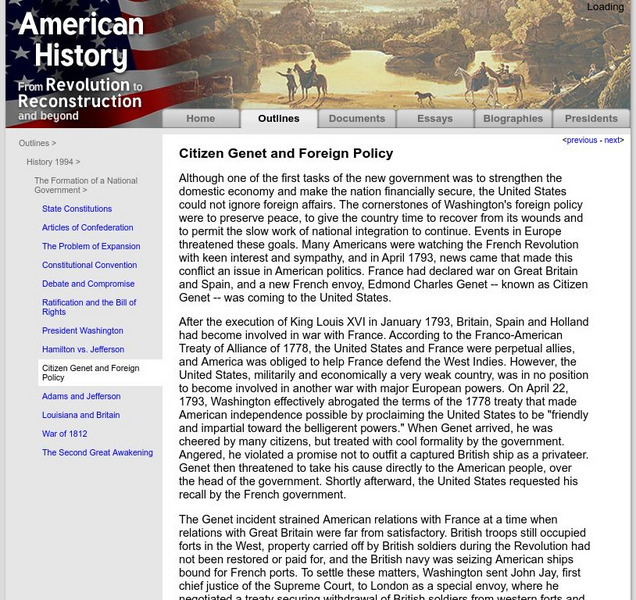Hi, what do you want to do?
National Endowment for the Humanities
Lesson 1: The United States Confronts Great Britain, 1793–1796
After the Revolutionary War, the success of the United States was far from guaranteed. Foreign powers coveted the new land, and Great Britain challenged American sovereignty. Learners consider the challenges facing the new nation using...
Curated OER
Campaign Posters 1788-1816
Seventh graders examine the first years of the U.S. under the U.S. Constitution. They identify the main themes of the Federalist and Republican parties, conduct research, and write a campaign speech and create a campaign poster.
Curated OER
Graphic Organizing: Early American History
In collaborative groups, young US historians sort cards (each labeled with a single early American event or issue) according to which of the first four presidents was leading the country at the time. Learners copy the events onto a...
Curated OER
Chapter 2 – The US From 1789 to 1815
In this U.S. history worksheet, students read assigned textbook pages about the country from 1789-1815 and respond to 36 short answer questions.
University of Groningen
American History: Documents: Proclamation of Neutrality 1793
The Proclamation of Neutrality was a formal announcement issued by President George Washington in May 1793, declaring the nation neutral in the conflict between France and Great Britain. It threatened legal proceedings against any...
This Nation
This Nation: Proclamation of Neutrality (1793)
Read the text of the Proclamation of Neutrality issued by George Washington in April, 1793, showing his effort to keep his new nation safe from unhealthy alliances.
Other
Early America: Explanation of Washington's Neutrality Proclamation
This article provides a good explanation of the reasons for Washington's neutrality proclamation. It also provides the text of the proclamation, and an original newspaper document.
Siteseen
Siteseen: American Historama: Neutrality Proclamation of 1793
Learn interesting facts about the Neutrality Proclamation of 1793 that prevented the risk of military engagement with either Britain or France.
Digital History
Digital History: Neutrality and the Jay Treaty [Pdf]
See why a war between Great Britain and France showed the vulnerablity of the new United States. Should the United States help France, after that country gave so much in the Revolutionary War, and risk the economic and military enmity of...
Other
Encyclopedia of American Foreign Policy: Civil War Diplomacy
An article by noted historian, Kinley Brauer, discusses the role of foreign policy for both the North and the South in the Civil War. An interesting, and often forgotten, aspect of the war.
University of Groningen
American History: Outlines: Genet and Foreign Policy
This article from the University of Groningen explains the role that Citizen Genet played in challenging foreign policy under Washington's administration.














